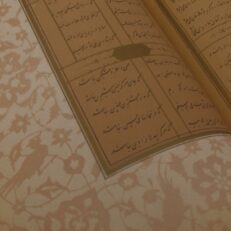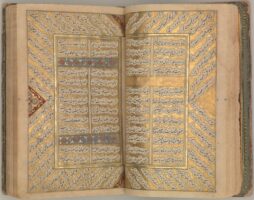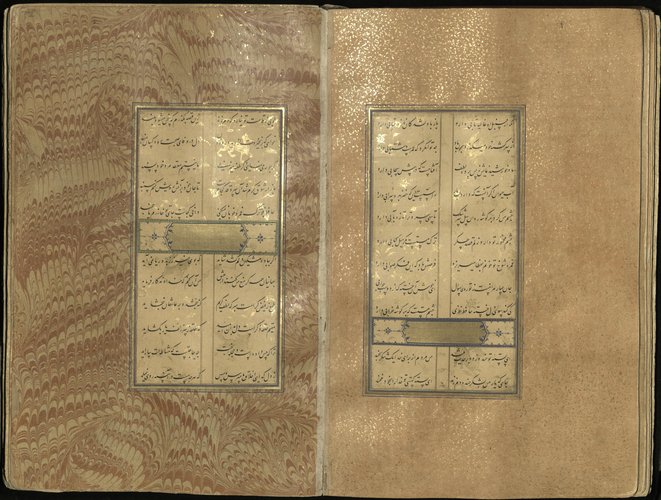The word Sufi means a primarily Muslim ascetic and mystic. The culture of Sufism has produced some of the world’s most beloved literature, like the love poems of the 13th century Iranian jurist Rumi.
At a time when poetry in Europe was in its earliest stages, the Middle East already had a robust tradition of poetry. The breadth of poetry stretches from the Ghazal to the Qasida, in areas of modern-day Iran through Ancient Egypt. Today we think of the ‘Middle East’ as a geographical area. Yet, the language and literature of Middle Eastern cultures, especially Arabic, had a widespread influence across multiple continents. It reached from India to Spain in the West, across modern-day North Africa, Turkey, Iran, and the Arabian Peninsula.
The earliest poetry was sung by the Tribal poets of the Arabian Peninsula, who memorised and recited tens of thousands of poems. These poems were used to declare war between tribes, resolve disputes, and preserve legends and history. In the traditional Islamic world everyone wrote poetry, from the beggar at the market to the Caliph at his palace. Official documents, sermons, excuses, insults, and love letters were all written in verse.

Need to ask a ruler to save your island, like the 9th century al-Zahra al-Soqotriyya? Just send them a good poem explaining the problem, as she did, with troops being quickly dispatched to her aid in response. Or perhaps you have a land dispute- why not compose some verses to defend your position like the 18th century Fatima al-Adiniyya successfully did? This poetry was not only about being in love (though it was a part of it), but it was also about being a wordsmith and intriguing others to get the favourable outcome you desire. One of the most common types of poems in this era was the “wuquf ‘ala al-atlal” or “stopping by ruins.” In these poems, a wandering poet paused in the middle of ruins to observe and reflect. Eventually, this type of ruin poetry became so common that poets would write satirical poems about “ruin-wandering.” Today though, ruins have taken on new significance because of the destructive warfare in the Middle East. Poets in the Middle East today use ruins to comment on the devastating effects of war on homes and families.
Henry Wadsworth’s assessment of what makes a great poet, perfectly sums up the effect of poetry worldwide and the camaraderie of human feeling.
‘All that is best in the great poets of all countries is not what is national to them, but what is universal. Their roots are in their native soil; but their branches wave in the unpatriotic air, that speaks the same language onto men, and their leaves shine with the illimitable light that pervades all lands.’

One of my favourite poets was the Hafiz of Sheeraz, a 14th century poet born in Shiraz, Persia who wrote Sufi poetry. He is one of the seven literary wonders of the world. Being a ‘Hafiz’ is a title received when someone memorises the Quran by heart. Emerson, who studied and translated his works, called him ‘a poet for poets’. The Hafiz was admired by all, with other notable examples including Arthur Conan Doyle, who had his character Sherlock quote the poet, and also the great Queen Victoria.
She is said to have consulted the Hafiz and his works in times of need, which had been a custom in the middle east for centuries. That custom was called the Fal-e-Hafiz, an ancient tradition in which the reader asks Hafiz for advice when facing a difficulty or at an important juncture in their life, treating his books as an oracle and opening them with a deep wish from their soul for guidance. His poetry is full of benevolence and the ability to comfort. The Hafiz achieved this no doubt with his 40 day and night vigils.
The most famous Sufi poet was Rumi. One of the most famous religious scholars of all time, Jalal al Din Rumi was a Persian poet born in today’s Afghanistan. In addition to his devotional manuscripts and poetry, he was also a great poet and scholar of Sufism. Rumi’s influence transcends national borders and ethnic divisions: Iranians, Tajiks, Turks, Greeks, Pashtuns; other Central Asian Muslims and the Muslims of the Indian subcontinent have greatly appreciated his spiritual legacy for the past seven centuries. His poems have been widely translated into many of the world’s languages and transposed into various formats. Rumi has been described as the “most popular’ and the “best selling’ poet in the United States. The bulk of his work is in Persian, but he also wrote in Turkish, Arabic and Greek. His poetry has influenced not only Persian literature, but also the literary traditions of the Ottoman Turkish, Chagatai, Urdu, Bengali, and Pashto languages.
One of the most beautiful examples of Persian lyrical poetry is the story of Layla and Majnun. The tale is a famous one, composed by Nizami Ganjavi in 1188. He adapted the tale well known in Persia from the 5th century. It took the style of Nabati poetry which was developed by the nomadic Bedouin tribes. The poems were composed in colloquial language with an informal style, and the themes range from odes like pieces of wisdom, declarations of love, historical accounts and more. Lord Byron called the collection the ‘Romeo and Juliet’ of the Middle East.
Qays Ibn al-Mullawah fell in love with Layla al-Aamiriya, and soon began composing poems about his love for her, mentioning her name often. His obsessive effort to woo the girl caused some locals to call him “Majnun.” When he asked for her hand in marriage, her father refused because it would be a scandal for Layla to marry someone considered mentally unbalanced. Soon after, Layla was forcibly married to another noble and rich merchant.

When Majnun heard of her marriage, he fled the tribal camp and began wandering the surrounding desert. His family eventually gave up hope for his return and left food for him in the wilderness. He could sometimes be seen reciting poetry to himself or writing in the sand with a stick.
Layla is generally depicted as having moved to a place in Northern Arabia with her husband, where she became ill and eventually died. In some versions, Layla dies of heartbreak from not being able to see her beloved. Majnun was later found dead in the wilderness in 688 AD, near Layla’s grave. He had carved three verses of poetry on a rock near the grave, which are the last three verses attributed to him.
The poetry of Rumi, the Hafiz and Ganjavi has touched and inspired countless generations from all four corners of the planet. It has educated many on Islam and Sufism, as well as Persian culture, with their ability to transport you and its ability to bring comfort.
I’ll end with my favourite quote by the Hafiz of Sheeraz:
‘I wish I could show you when you are lonely or in darkness, the astonishing light of your own being.’
By Alesha Jiva